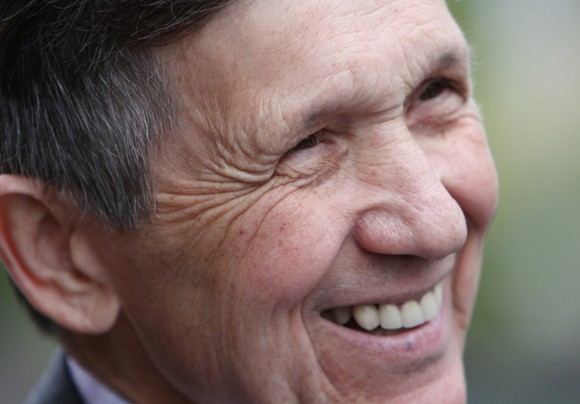
REP. DENNIS KUCINICH SUFFERS PRIMARY DEFEAT IN OHIO
Paul Kane
Rep. Dennis J. Kucinich (D-Ohio), the two-time presidential candidate and icon of the antiwar left, suffered a bruising primary defeat Tuesday as a new Republican-drawn congressional map threatened to end the career of one of the most colorful figures in Congress.
With most attention focused on the state’s GOP presidential primary battle, and no Democratic primary for president, Kucinich was left in a low-turnout race in a newly drawn district against his once-close ally, Rep. Marcy Kaptur (D-Ohio).
With about 90 percent of the vote in, Kaptur led 60 to 36 percent.
From his stint as Cleveland’s “Boy Mayor” in the late 1970s, including defaults when he refused to sell the city’s electric plant, to his unsuccessful effort to impeach Vice President Richard B. Cheney in 2007, Kucinich has repeatedly thrust himself into the national spotlight. Often coming up on the short end of his fights, Kucinich, 65, never stopped swinging but usually did so in a friendly spirit.
His defeat, according to lawmakers, was the latest development in a process that is making Congress a more sanitized, less colorful place. Some of the institution’s most original characters are either retiring or losing reelection battles, in part because their positions or personalities are so easy to caricature. Reps. Barney Frank (D-Mass.) and Norm Dicks (D-Wash.), for example, have announced their retirements.
“The one thing that’s being tamped down here is, we’re losing characters. When I got here, you had Jim Traficant, you had Barney, and then Dennis came,” said Rep. Steven C. LaTourette (R-Ohio), a nine-term veteran, referring to Frank and former congressman James Traficant, who ended up in prison on corruption charges.
“The place needs character, and characters.”
What’s next for Kucinich is unclear. He has spoken of possibly moving to Washington state to run in a Democratic-leaning district. He would need to establish residency there by mid-April, but it’s not certain he could do that while remaining in Congress representing an Ohio district.
That dalliance — he flew to the state last May to consider it — played into the theme that Kaptur used against him, saying he is more concerned with his quixotic fights against powerful international forces than delivering for the people of his district.
She compared his consideration of leaving Cleveland to the mid-1990s move by the city’s beloved football team, the Browns, and the 2010 departure of NBA superstar LeBron James — two psychic blows still deeply felt in a place that bills itself as the “Sixth City” even though it’s fallen to the country’s 45th largest in the last 50 years .
“Looks like next in line to abandon us is Dennis Kucinich,” Kaptur’s narrator said in a radio ad.
The new 9th Congressional District stretches more than 100 miles from Cleveland (Kucinich’s base) all the way west to Toledo, encompassing 47 percent of her current district. That gave her an edge, as did her years of work on the Appropriations Committee, from which she funneled hundreds of millions of dollars to northern Ohio.
With Dicks’s retirement, Kaptur could become the top Democrat on the committee.
“I feel that Marcy Kaptur is more qualified to represent this new district. Basically, she is a workhorse, and Congressman Kucinich is a show horse,” former senator George Voinovich (R-Ohio) said Tuesday afternoon, explaining his preference that, if a Democrat must represent his home town, it would be Kaptur.

Ken Lambert/AP - Rep. Dennis J. Kucinich (D-Ohio), the two-time presidential candidate and liberal icon of the antiwar left, was fighting for his political life Tuesday as a new GOP-drawn congressional map threatened to derail the career of one of the most colorful figures in Congress.
Voinovich first tussled with Kucinich in 1979 when he ended Kucinich’s one mayoral term in a rout. Elected to the city council at 23 and mayor at 31, the always boyish-looking Kucinich took over Cleveland at the start of an acute period of economic decline in the Rust Belt. Rather than compromise, he fought with the banks and endured two defaults for his city, barely surviving a recall effort.
After his reelection defeat, Kucinich entered a period of political exile, reemerging in 1996 to win the House seat representing the western end of Cleveland and its suburbs. He became a leading liberal, and A trifecta of political developments — the 2003 invasion of Iraq, Kucinich’s 2004 presidential campaign and the political polarization of cable TV news — elevated his national profile as an uncompromising voice of the left.
Kucinich used his cable appearances to tout ideas such as the creation of a Department of Peace. He became a hero among elite liberals, particularly Hollywood figures such as Sean Penn and Danny Glover. By January 2008, however, his long-shot bids for president were grating on Cleveland’s business community, which wanted a congressman who focused on more parochial issues.
He left the presidential trail and won a tough primary fueled by last-minute cash from the likes of Hustler publisher Larry Flynt and the Medical Marijuana PAC.
Kucinich took the gavel of a subcommittee examining the financial bailouts, finding kindred spirits among some of the chamber’s most conservative lawmakers. “Even though we were right and left, we were on the same page,” said Rep. Jim Jordan (Ohio), who has served as the top Republican on that subcommittee. “I’ve always appreciated people on the left who genuinely believe in something. He’s a true believer.”
